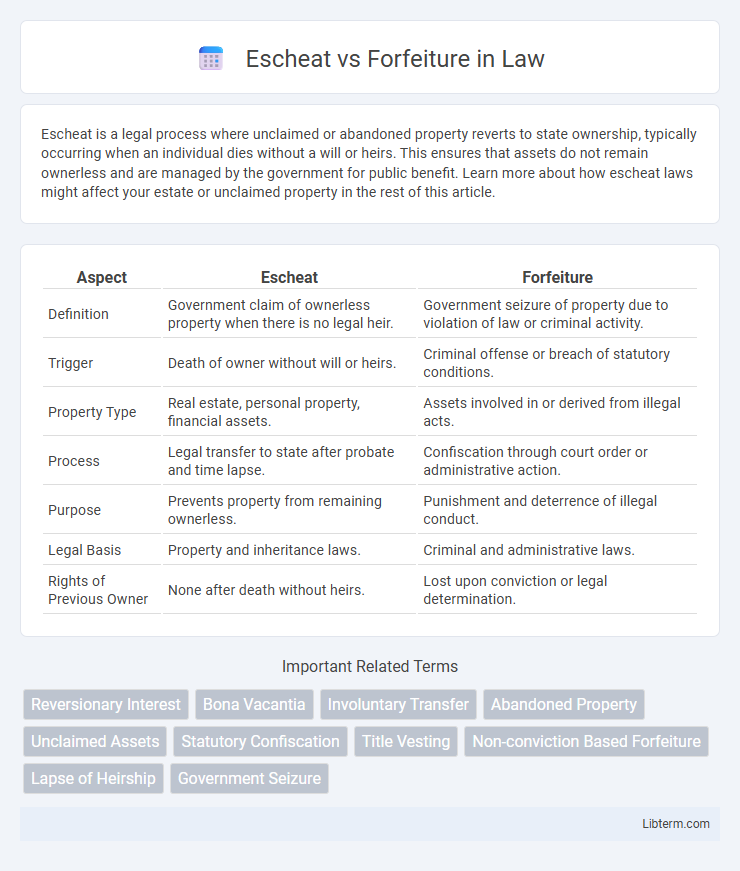Escheat is a legal process where unclaimed or abandoned property reverts to state ownership, typically occurring when an individual dies without a will or heirs. This ensures that assets do not remain ownerless and are managed by the government for public benefit. Learn more about how escheat laws might affect your estate or unclaimed property in the rest of this article.
Table of Comparison
| Aspect | Escheat | Forfeiture |
|---|---|---|
| Definition | Government claim of ownerless property when there is no legal heir. | Government seizure of property due to violation of law or criminal activity. |
| Trigger | Death of owner without will or heirs. | Criminal offense or breach of statutory conditions. |
| Property Type | Real estate, personal property, financial assets. | Assets involved in or derived from illegal acts. |
| Process | Legal transfer to state after probate and time lapse. | Confiscation through court order or administrative action. |
| Purpose | Prevents property from remaining ownerless. | Punishment and deterrence of illegal conduct. |
| Legal Basis | Property and inheritance laws. | Criminal and administrative laws. |
| Rights of Previous Owner | None after death without heirs. | Lost upon conviction or legal determination. |
Introduction to Escheat and Forfeiture
Escheat is a legal process where unclaimed or abandoned property reverts to the state when there are no legal heirs or claimants, ensuring assets do not remain ownerless. Forfeiture involves the government seizing property tied to criminal activity or violations of law, serving as a punitive and preventive measure. Both concepts are vital in property law, regulating ownership and rights when property is unclaimed or linked to illicit acts.
Definition of Escheat
Escheat is the legal process by which unclaimed or abandoned property reverts to state ownership when no heirs or claimants are identified. This principle ensures that property without a rightful owner does not remain ownerless indefinitely and supports public interests. Unlike forfeiture, which involves property taken due to legal violations, escheat is purely a matter of inheritance law and ownership succession.
Definition of Forfeiture
Forfeiture refers to the legal process by which a government seizes property or assets due to a violation of law, often involving criminal activity or failure to comply with regulatory requirements. This process is distinct from escheat, which occurs when property reverts to the state due to the owner's death without heirs or will. Forfeiture typically aims to deter illegal conduct by depriving individuals of property linked to unlawful behavior.
Legal Basis of Escheat
Escheat is a legal process grounded in property law that allows the state to claim ownership of a deceased person's unclaimed or abandoned property when no heirs or claimants are identified. This principle ensures that property does not remain ownerless, preventing potential legal ambiguities and promoting efficient management of resources under state jurisdiction. The legal basis of escheat is typically codified in state statutes, reflecting common law traditions to safeguard public interest by transferring unclaimed assets to the government.
Legal Basis of Forfeiture
Forfeiture is grounded in statutory law and often arises from criminal activities where assets are seized to prevent further illegal use, supported by laws such as the Civil Asset Forfeiture Act. The legal basis typically requires proving the connection between property and unlawful conduct, enabling authorities to confiscate assets without necessarily charging the owner with a crime. This contrasts with escheat, which is a common law principle addressing property without heirs or owners, reverting ownership to the state.
Key Differences Between Escheat and Forfeiture
Escheat occurs when property reverts to the state due to the absence of legal heirs or claimants, commonly involving unclaimed estates or abandoned property, whereas forfeiture involves the government seizing assets connected to criminal activity or legal violations. Escheat emphasizes ownership transfer due to lack of heirs, with state laws governing unclaimed property procedures, while forfeiture is a punitive measure linked to illegal conduct, often requiring legal proceedings or court orders. The legal foundation of escheat lies in property and inheritance law, distinct from forfeiture's basis in criminal and regulatory law enforcement actions.
Common Scenarios for Escheat
Common scenarios for escheat typically involve unclaimed or abandoned property such as dormant bank accounts, uncashed checks, and inactive safe deposit boxes. Escheat applies when the rightful owner cannot be located after a specified period, resulting in the property reverting to state ownership. This process ensures that unclaimed assets are protected and prevents private entities from indefinitely holding abandoned property.
Typical Cases Resulting in Forfeiture
Typical cases resulting in forfeiture include criminal convictions involving drug trafficking, fraud, or money laundering where assets are seized under laws targeting proceeds of crime. Property used in the commission of a felony, such as vehicles or real estate linked to illegal activities, often faces forfeiture. Unlike escheat, which occurs when there are no heirs to inherit property, forfeiture specifically targets assets connected to unlawful conduct.
Implications for Property Owners
Escheat transfers ownership of abandoned or unclaimed property to the state, often after an extended period with no activity or heirs, impacting property owners who may lose assets without clear heirs. Forfeiture involves the government seizing property used in criminal activity or obtained through illegal means, posing significant legal and financial risks for property owners accused of wrongdoing. Both processes can result in permanent loss of property rights, emphasizing the importance for owners to maintain clear title and comply with relevant laws to protect their assets.
Escheat and Forfeiture: Comparative Summary
Escheat refers to the government's legal process of claiming ownership of property when an individual dies without a will or heirs, ensuring unclaimed assets return to the state. Forfeiture, on the other hand, involves the seizure of assets by the government due to involvement in criminal activity or violation of laws. Both escheat and forfeiture serve different legal purposes: escheat addresses inheritance voids while forfeiture targets illegal conduct, each governed by specific statutes and procedures.
Escheat Infographic

 libterm.com
libterm.com